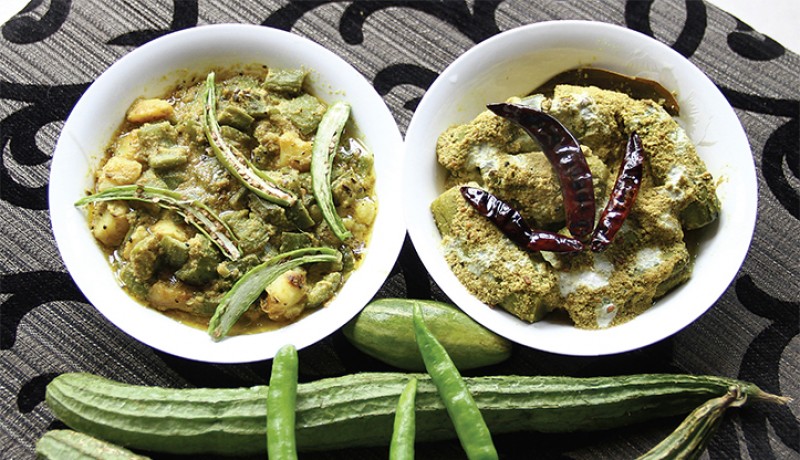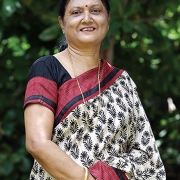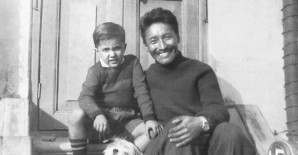
Columns

A series by Pratibha Jain about silvers who believe nurturing the body and mind is the key to joy.
Featuring Rita Barua from Chennai
I went expecting some delicious Bengali vegetarian recipes and an interesting conversation. But when I left, I carried back an experience that was so poignant and unexpected—of seeing a family where caste and class distinction have been erased, paving the way for mutual care and respect. A quality Rakhi Kapoor has inherited from her beautiful mother, Rita Barua, 63, a Bengali from Chennai. I met them both at Rakhi’s home; we chatted over a warm cuppa and delicious snacks.
Namaste Ritaji. A pleasure to meet you. Can we start at the beginning?
Rita Barua: I grew up in an orthodox Hindu family in Tripura [Agartala]. My parents were strict and my mother was very particular that we excel in whatever we did. During college days, I was really involved in student forums and almost decided to join politics. But I did not pursue it. Sometimes, when I see where some of my friends are today, I do wonder if I made the right choice.
You mean you wish you had pursued either a career or social work?
Yes. My daughter keeps saying I did not use my potential at all. But life takes its own turns and we have to prioritise. After my post-graduation, I met my husband D J Barua. We decided to get married. He is a Bengali Buddhist, so that decision was a big one as it was an interfaith marriage.
Did the respective families agree easily?
His father was delighted because one of their gurus, a Buddhist monk, met me and told him right away that I would be perfect for his son. My parents also took a great liking to him. As luck would have it, on the third day after our marriage, he got a job in ONGC where he worked until he finally retired as group general manager.
When did you shift from Kolkata to Chennai?
My husband’s job was transferrable, so I could not take up a job. When my daughter Rakhi was born, I felt that unless I settled down, I could not give her a good upbringing. So in 1983, when my husband was transferred to Chennai, I decided to settle down here. He continued with his job but Chennai became our base. This feels like my hometown now.
That’s wonderful. So you must have brought up your children singlehandedly most of the time.
Yes, I was like a single mom to my son and daughter. My son Rahul has settled in Texas, US. My daughter Rakhi is in Chennai and runs a maternity studio. I feel satisfied when I see my children and their success.
How did you manage during their growing years?
We were always blessed with good domestic staff. Otherwise it would have been tough to manage.
As we were speaking, a young toddler came by and stood at the entrance of the room, gurgling with delight. Instantly, Rakhi and Ritaji exclaimed with echoed delight and started playing with her. I thought she was a neighbour’s child, well-dressed and carrying lovely stuffed toys. I stared in disbelief when Rakhi told me the little one, Arohi, was the daughter of her domestic staff, Pintu Singh.
I have heard of people who carry no caste and class distinctions in their heart. But to see it face to face is heart-warming.
Rita: My husband was hardly ever at home; even when he was, he was never the disciplinarian. In his extended absence, my staff was my support system. To me, they are my family.
Rakhi: We have grown up listening and seeing our parents treat their staff with equal respect and dignity. It is now second nature to us. And in turn, they really take care of us. You should see the way my staff manages the house, touchwood!
By then, Pintu Singh came with a round of snacks and served us with such affection that I could see Rakhi meant what she said.
I am truly touched. Tell me more.
Rita: I used to tell my staff one thing: The house and everything else are second priority. You are here for my children. We tell them what we expect but do not nag them. We give them freedom. This is their house too. To me, Arohi is as dear as my grandsons Ricky and Rian. She gives me as much pleasure. Tell me, if we can spend lavishly on our friends and relatives, why not on our staff who are such an integral part of our life? Rakhi does not like to cook but Pintu Singh knows to prepare her favourite dishes. He has learnt from me.
Rakhi: She enjoys rubbing it in that I do not cook. But my bhabhi Suparna has made up for it. She cooks really well and can lay out a delicious spread on the table effortlessly.
Rita: Yes, Suparna just picked up on her own and now makes even our traditional Bengali dishes very well.
According to you, is food a connecting factor?
Of course. This is why I have always had one strict rule: the family has to share one meal together. Usually it is dinner. There is something about eating together that creates a bond among the people sharing the meal. And if the meal is comfort food, it is even more binding.
What are some of your favourite family recipes?
Rakhi: Let me answer that. Mom not only cooks well but loves to feed endlessly. We are all crazy about her typical Bengali dishes such as chorchori and labra (both are mixed vegetables). Also her kheer with the special jaggery that comes around winters—patali gur (date palm jaggery). Her parwal with khus-khus gravy known as potol is to die for.
And yet, Rakhi, you don’t like to cook?
Rakhi: My husband Vijay and I enjoy entertaining and I depend on Pintu Singh for that. In turn, we also treat him and his family. We take them out for dinners on their birthdays.
Rita: People matter, whether they are relatives, friends or people who work with you. More than anything, I remember the good social work I did with the Mahila Samiti where I was the president. I enjoy interacting with people and I truly believe in this sentence: “Alone I can smile, together we can laugh; alone I can say, together we can speak; alone I can enjoy, together we can celebrate. We are nothing without each other.”
What’s on the bucket list?
Nothing much, but I do miss being with my little grandson Rian. I still remember enjoying walking with him in the stroller when I visited Texas last month. The open and clean spaces and the long walks are a cherished memory.
As I left, I could see Rakhi carrying little Arohi to the park opposite her house, wiping her nose and tidying her dress, amid squeals of laughter. Indeed a heartening moment to carry back home.
Potol posto
Pointed gourd with poppy seeds masala
Known as potol in Bengali and parwal in Hindi, pointed gourd cooked in a gravy of coconut and poppy seeds is a family favourite at Rita Barua’s home. A popular Bengali dish, it is cooked by making thin slits on the gourd so it does not break, yet allows the spices to be soaked into the vegetable well.
Ingredients
- Pointed gourd: 8; medium-sized
- Bay leaf: 1
- Turmeric powder: ¼ tsp
- Panch phoran [a mixture of cumin (jeera), nigella (kalonji), fenugreek (methi), coriander (dhaniya) and mustard (rai) seeds]: 1 tsp
- Green chillies: 2; slit
- Cumin powder: ½ tsp
- Yoghurt: 1 tbsp; beaten
- Mustard oil: 2 tbsp
- Salt to taste
For the paste
- Poppy seeds (khus-khus): 1 tbsp
- Coconut (fresh): 1 tbsp; grated
- Green chillies: 2
Method
Scrape the pointed gourd lightly and create small lengthwise slits around it such that it doesn’t break. Soak the poppy seeds for 10-15 minutes in hot water. Grind along with coconut and green chillies into a thick paste. Heat ½ tbsp oil in a thick-bottomed pan and add the pointed gourd. Add a pinch of turmeric and salt and stir gently for 3-4 minutes on low heat until the gourd turns light brown Transfer to a dish and set aside. In the same pan, heat 1 tbsp oil and add the bay leaf. Add the panch phoran, green chillies and the poppy seed paste. Stir for 2 minutes; add turmeric powder, cumin powder, yoghurt, salt and roasted pointed gourd. Sprinkle water and let cook for 3-4 minutes. Switch off the flame and drizzle mustard oil on top. Serve with steamed rice or hot rotis.
Ritaji’s recommendations
Replace fresh coconut with coconut milk for a richer gravy. Add a dash of oregano at the end for an enhanced flavour.
Make the popular jhinga posto with the same recipe, substituting pointed gourd with roasted potatoes and/or tender ridge gourd (jhinga in Bengali, turai in Hindi).
Pratibha Jain, an author and translator from Chennai, is the co-author of two award-winning books Cooking at Home with Pedatha and Sukham Ayu. Her area of specialisation is documenting Indian traditions through research, translation and writing
Photographs by Chennai Pix Featured in Harmony — Celebrate Age Magazine October 2016
you may also like to read
-
Mental workout
Mukul Sharma tells you how to keep those grey cells ticking Everyone will ultimately lose his or her brain….
-
Helpline
Dr Harshbir Rana answers your queries on personal and social issues related to ageing, elder care and intergenerational relationships ….
-
Off the cuff
Raju Mukherji pays tribute to his first hero, Tenzing Norgay, an exemplary mountaineer Darjeeling, 1955. Dr ‘Pahari’ Guha Mazumdar….
-
Yoga RX
Shameem Akthar shows ways to control debilitating ankle pain through regular practice Ankle pain is so common and prevalent….








